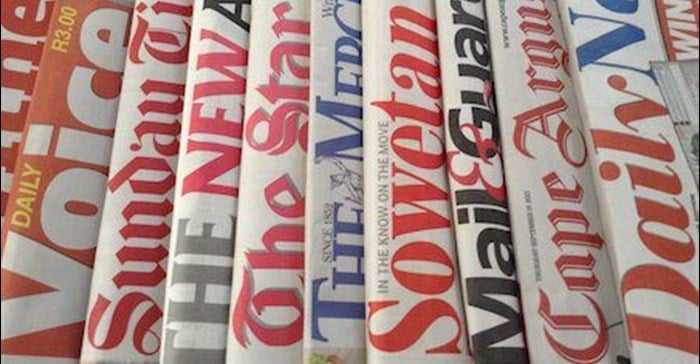
Related
Top stories






More news


Marketing & Media
Ads are coming to AI. Does that really have to be such a bad thing?














The AIP says the R38m Economic Development Fund (EDF), administered by the MDDA, should mostly be used to fund media “sustainability projects” and not start-ups and students.
The EDF was established after the Competition Commission found in 2011 that 31 large media companies were breaching the Competition Act by price-fixing advertisement costs. The Competition Tribunal fined them R38m.
The Competition Commission appointed the MDDA to administer and manage the fund in 2017. The MDDA is a statutory development agency established in 2003 in terms of the MDDA Act. It provides grant funding to various media projects.
But the Association of Independent Publishers (AIP), a lobby group representing more than 200 community print publications, is unhappy with the Memorandum of Understanding signed between the Competition Commission and the MDDA.
AIP members include small, grassroots print publications, which the AIP argues are most affected by uncompetitive behaviour.
In a press statement issued on 26 April, the AIP said the MDDA is “failing in its fiduciary duties” by distributing the EDF grants as bursaries for students and seed funding for start-ups.
“AIP members are small independent grassroots publishers that publish mainly in rural areas, informal settlements and townships,” AIP executive director, Kate Skinner told GroundUp. “AIP members significantly contribute to diversity. Our members were the ones that suffered directly from the unfair competition.”
Skinner says AIP members publish in areas mainstream media does not reach and in less published languages.
“If our publications close then there will be news deserts in small towns and rural areas. The only media that will cover these areas will be the SABC and in certain places community radio,” she says.
The MDDA confirmed to GroundUp that of the R38.7m, R5.2m would be paid to sustainability projects. The remainder will be used for scholarships (R13.9m), start-up projects already supported by the MDDA (R13.9m), and the cost of administering the fund (R3.8m).
The MDDA said this is in line with the Memorandum of Understanding between the MDDA and the Competition Commission signed in July 2020. According to the memo 30% of the fund is earmarked for bursaries and the rest for black-owned media start-ups and sustainability projects, while 10% of the fund is allocated to administration costs.
The AIP said it was sidelined during the decision-making process even though it had played a crucial role in researching the price-fixing of advertising costs, which was found to mostly impact small print publications. But neither the Competition Commission nor the MDDA consulted it before signing the memo, the AIP says.
The AIP wants the fund to include a “reparations” category for affected publications. It argues that funding the studies of students will just add to the unemployment crisis in the media industry. It wants at least R19.2m to be granted to sustainability projects, and for the criteria to be updated to prioritise affected publications.
The AIP also said the administrators appointed by the MDDA are unlikely to prioritise community print media as they do not understand how the industry works.
Skinner says that in April 2020, then director of the AIP Carol Mohlala wrote an open letter to the Presidency. In response, the late Minister in the Presidency Jackson Mthembu set up a committee with the MDDA, AIP and the department for government communications (GCIS). The committee met once but collapsed after Mthembu died.
A meeting between AIP members and the Competition Commission took place in February 2021. Suggestions were made on how the funds could be used to benefit community print media. But, according to Skinner, these discussions dried up.
In April 2021, the AIP was told by the Competition Commission that there would be no changes made to the memo.
The AIP continued lobbying and met with the MDDA board in April this year. The AIP was told that no changes to the fund’s structure could be made. “We’re planning legal action,” says Skinner.
In a written response to GroundUp, the MDDA said that it “is not in an authoritative position to dictate how [the] funds should be structured”. It said that it is only an implementing agency.
Competition Commission spokesperson Siyabulela Makunga said that the MDDA was appointed because it “is the statutory body responsible for the development of small media agencies”.
Makunga also said that there was “no need to amend the beneficiary criteria or the memorandum, given that all publishers, including members of the AIP, qualify as beneficiaries to the EDF”.
The structure of the fund was decided in accordance with the order of the Commission Tribunal, Makunga said. He said there had been an opportunity for the public to participate in the tribunal proceedings as published by the Competition Commission’s press statements from 2017 onwards.
Bursaries from the fund for 2021 and 2022 have already been disbursed and the start-up and sustainability funds will be disbursed mid-June, the MDDA said.

GroundUp is a community news organisation that focuses on social justice stories in vulnerable communities. We want our stories to make a difference.
Go to: http://www.groundup.org.za/